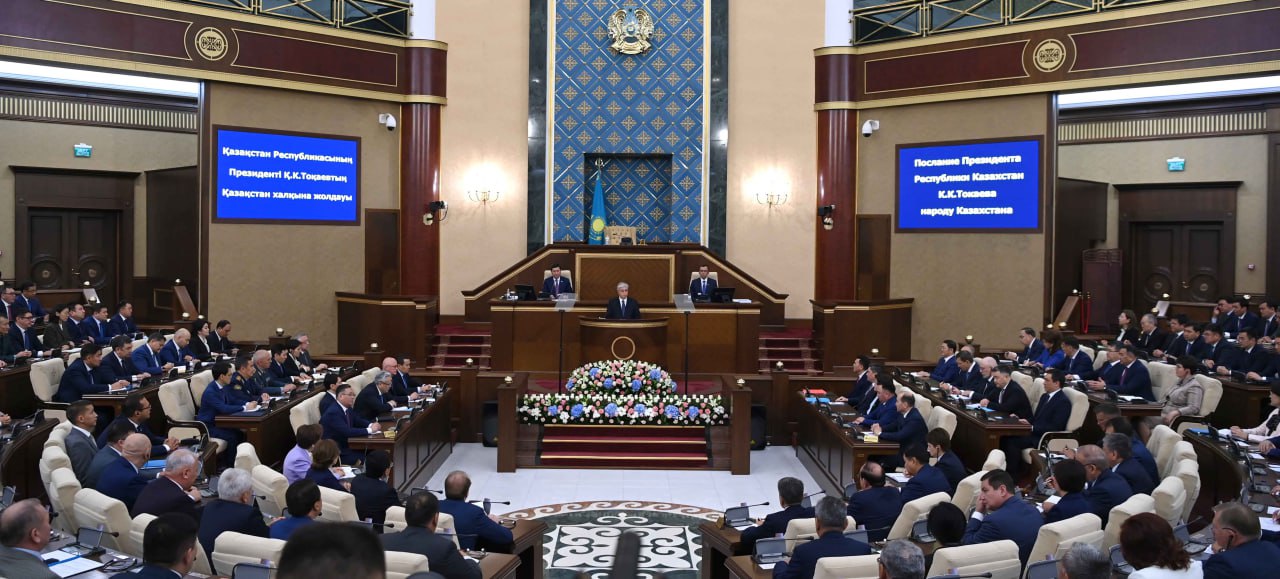ASTANA – Kazakh President Kassym-Jomart Tokayev underlined the need for infrastructure modernization, energy efficiency and security during his Sept. 1 state-of-the-nation address, reported the Akorda press service.

Kazakh President Tokayev underlined the need for infrastructure modernization, energy efficiency and security during his Sept. 1 state-of-the-nation address. Photo credit: Akorda.
“A series of accidents at thermal power plants last winter sharply highlighted the problems of infrastructure depreciation that had accumulated over the years. Outdated infrastructure has a direct impact both on the social well-being of citizens and on the pace of a country’s industrialization. Obviously, it is impossible to implement a new economic model without infrastructure modernization,” Tokayev said.
Referring to the power sector, Tokayev mentioned that at least 14 gigawatts of new energy capacities will be introduced in the coming five years. This year, the reconstruction of the first unit of the Ekibastuz power plant-1 will be completed to operate all eight units.
A project is being implemented to expand Ekibastuz power plant-2, and a project to build Ekibastuz power plant-3 is underway.
“Kazakhstan should not import electricity, and be dependent on neighboring countries. What is happening now is unacceptable from all points of view, primarily from the point of view of the security of the state,” he said.
Tokayev also addressed the implementation of renewable energy projects and the development of hydroelectric power plants.
“Energy, heat and water supply are a single technologically interconnected system. It must be approached as a separate important branch of the economy. The current approach has largely exhausted itself. Today new solutions are required.” the President said.
He paid much attention to renewing the tariff policy, introducing new methods of tariff setting, and increasing the investment attractiveness of the industry. Adequate market tariffs to natural monopoly entities for five to seven years are needed.
“At the same time, the responsibility of monopolists should be significantly increased. The country should introduce digital control tools and expand citizens’ access to information on the implementation of tariff estimates and investment programs,” Tokayev said.
The country’s gasification was also on the agenda. Expanding the resource base of marketable gas is a priority task for the government and the national gas company, Tokayev said, tasking them to accelerate the construction of new gas processing plants and fully involve the existing processing capacities.
“Oil and gas giants – Tengiz, Kashagan, Karachaganak – must be reliable suppliers of affordable gas. It is also important to attract investment in the exploration and development of new gas fields. Electricity, heat and water are the basic goods necessary for a comfortable life. Their use must be approached responsibly and prudently,” he said.
He also proposed that the government revise the current energy efficiency policy, considering the Organization for Economic Co-operation and Development (OECD) standards.
Touching upon renewable energy, Tokayev reiterated the country’s efforts, including a new Environmental Code that came into effect in July 2022 and a strategy for achieving carbon neutrality until 2060 adopted in February.
The share of renewable energy in total generation has increased to almost 5% over the past five years. By 2027, another 1.4 gigawatts of capacity will be commissioned.
“It is necessary to improve approaches to managing the entire energy industry: from generation to sales. It is necessary to develop hydrogen generation. The expansion of generation facilities is the basis for technology transfer and localization of production in power engineering, the creation of a battery industry. Fortunately, we have enough raw materials,” he said.
According to the President, new solutions are required in creating balancing capacities and energy storage systems. The transition to carbon neutrality can be accelerated by trading in greenhouse gas emissions. He said that the government and business should take advantage of opportunities in these areas.
“It is becoming increasingly important for leading economies to attract green finance. Over the past seven years, more than $2.5 trillion in the world has been directed to green bonds. ESG (environmental, social, and corporate governance) principles have become standard practice for financial institutions in a short period of time. In this regard, the Astana International Financial Centre (AIFC) should become the main platform in our region to attract green funding,” Tokayev said.
Water security was also one of the key topics of the President’s address. Losses in agriculture, the key consumer of water, reach 40% in some regions. The actual depreciation of water facilities exceeds 60%. To correct the situation, the country needs decisive and prompt measures.
“First, it is necessary to accelerate the introduction of advanced water-saving technologies – up to 150,000 hectares per year. It is necessary to solve the issue of accumulation of melt water and losses during its transmission, because this is our internal reserve. To do this, it is necessary to build 20 new and reconstruct at least 15 existing reservoirs, modernize and digitize at least 3,500 kilometers of canals. The goal is to provide an additional two cubic kilometers of water by 2027,” the President said.
The President announced the creation of a new Ministry of Water Resources and Irrigation to ensure effective development of the water management system.
Tokayev also instructed the government to interact with neighboring states for rational use of water resources.

